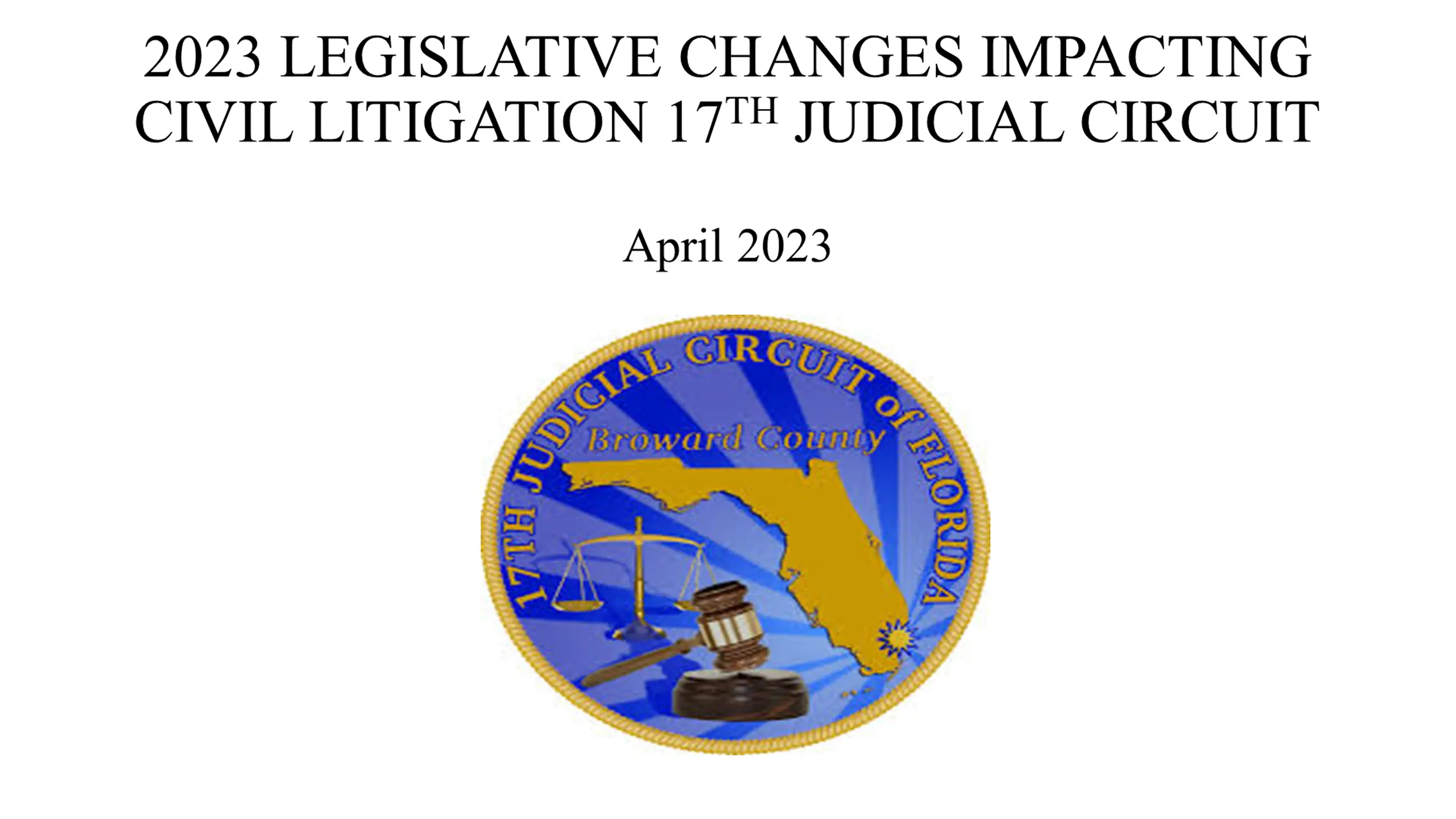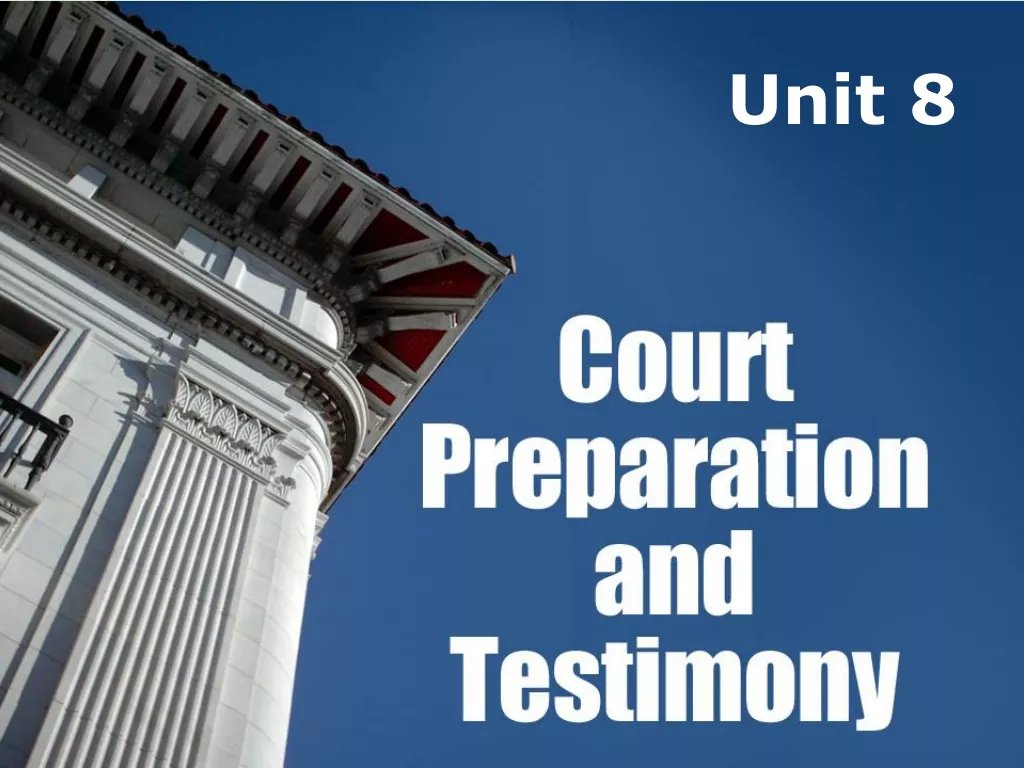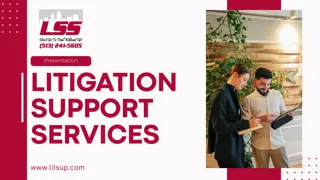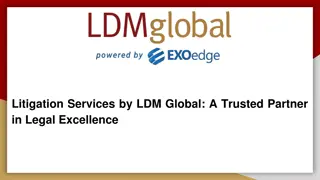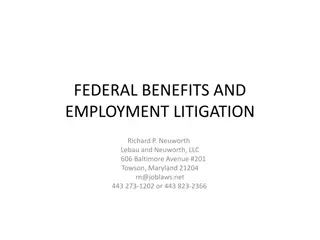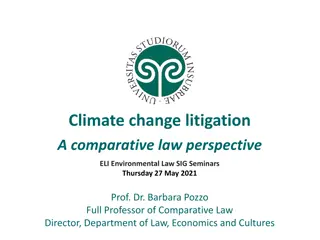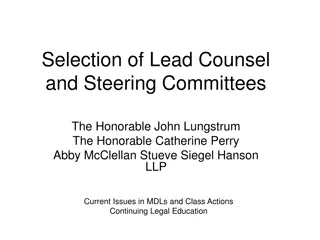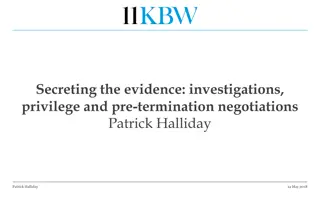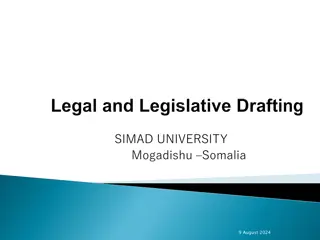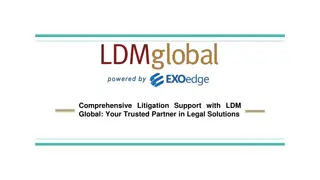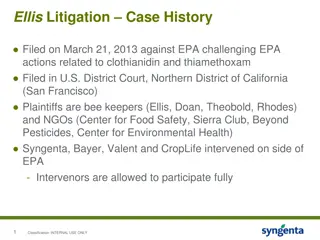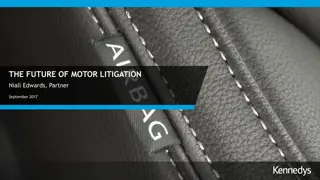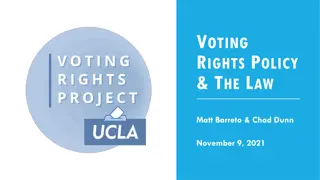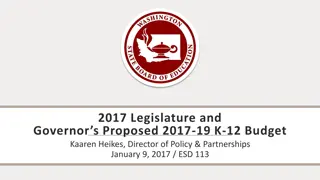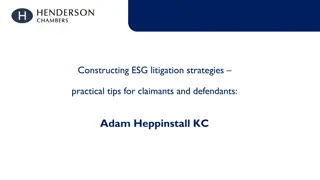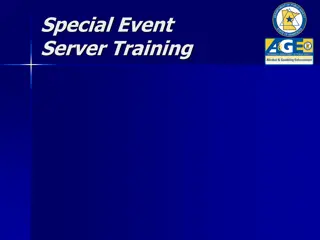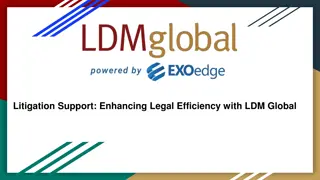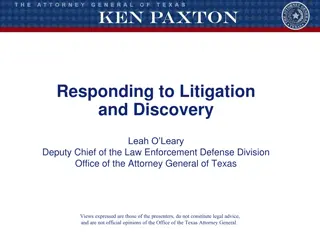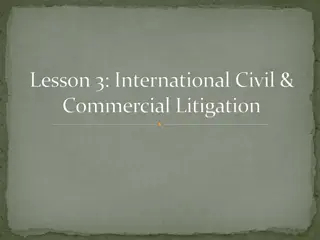2023 Legislative Changes Impacting Civil Litigation
Explore the significant legislative changes affecting civil litigation in the 17th Judicial Circuit as of April 2023. Learn about the newly filed cases and the potential impact of these changes on the legal landscape.
Download Presentation

Please find below an Image/Link to download the presentation.
The content on the website is provided AS IS for your information and personal use only. It may not be sold, licensed, or shared on other websites without obtaining consent from the author.If you encounter any issues during the download, it is possible that the publisher has removed the file from their server.
You are allowed to download the files provided on this website for personal or commercial use, subject to the condition that they are used lawfully. All files are the property of their respective owners.
The content on the website is provided AS IS for your information and personal use only. It may not be sold, licensed, or shared on other websites without obtaining consent from the author.
E N D
Presentation Transcript
2023 LEGISLATIVE CHANGES IMPACTING CIVIL LITIGATION 17THJUDICIAL CIRCUIT April 2023
NEWLY FILED CASES 17TH JUDICIAL CIRCUIT FEBRUARY 13, 2023- MARCH 24, 2023
00 Unassigned, Judge 7 02 Bowman, John B. 768 03 Casey, Daniel A. 771 04 Haury, William W., Jr. 769 05 Bidwill, Martin J. 771 07 Tuter, Jack 7 08 Haimes, David A. 765 09 Levenson, Jeffrey R. 777 100 Powell, Jackie 802 11 Garcia-Wood, Marina 230 12 Frink, Keathan B. 768 13 Robinson, Michael A. 774 14 Rodriguez, Carlos Augusto 772 18 Fahnestock, Fabienne E. 772 21 Singer, Michele Towbin 763 25 Olefson, Shari Africk 773 27 Bidwill, Martin J. 7 Total newly filed Circuit civil 10,296
47 McCarthy, Kathleen 2,295 48 Hilal, Jennifer Wigand 792 49 Di Pietro, Nina W. 737 50 Cohen, Mardi Levey 751 51 McHugh, Kathleen 740 52 Miranda, Giuseppina 734 53 Lee, Robert W. 772 54 Barner, Florence Taylor 685 55 Kanner, Daniel J. 770 56 Benson, Betsy 784 60 Gilman, Allison 927 61 Cawthon, Corey Amanda 945 62 Miller, Terri-Ann 921 70 Mollica, Kim Theresa 933 71 Schiff, Louis H. 944 72 Hurley, John 961 73 DeLuca, Steven P. 942 80 Levine, Olga 727 81 Eves, Tabitha Blackmon 723 82 Evans, Kal 707 83 Feld, Ellen 715 Judge AP, Appeals 2 Judge AW, Appeals 1 Total newly filed County civil 18,508 Total 28,804
ABOTA ISSUES Do you envision any way retired Circuit Court and County Court Judges can be mobilized to help the Circuit Civil Division deal with what is likely to be an imminent flood of hearing requests?
Is there any funding available from the Legislature for immediate use of General Magistrates to help the Circuit Civil Division with hearings on discovery disputes? (If not, the Legislative Session is not over until May, and ABOTA Fort Lauderdale can see if there is any opportunity to secure such emergency funding on a bipartisan basis).
Similarly, would a project with NSU Law seeking recruits (beginning third year law students) to act as Law Clerks for the Circuit Civil Division be of assistance to the Court? (ABOTA Fort Lauderdale can reach out to the Dean of the Law School immediately to determine the feasibility of such an initiative).
Can retired attorneys be asked to serve as temporary law clerks or serve in case management roles for the next 6-12 months to help with the administration of the sudden increase in case volumes? Would such volunteers be welcome by the Court?
Regarding Motion Calendar, can consideration be given to adding an additional day of 8:45 hearings (per Division) for the next 6-12 months, or one or two additional Motion Calendar time periods during the week per Division?
Can the Courts consider promoting the use of Arbitrators under Fla. R. Civ. P. 1.810, 1.820, and 1.830 to handle discovery disputes to try to ease the burden on the Courts
Can Chief Judges throughout the State request the Florida Supreme Court provide more discretion to Trial Judges when considering Motions for Continuance given the time limitations set forth Florida Rule of General Practice and Judicial Administration 2.545 (a), (b) and (e)?
Can the Seventeenth Judicial Circuit take immediate measures to address ethical and practical issues in setting Motion Calendar and Special Set hearings. This could involve a Local Rule.
On a short-term basis the number of new cases has to potential to overwhelm cms self-scheduling Will the crisis be on motion calendar or special sets? What are possible short-term solutions
Ordering the ability to self-schedule if texts, emails etc are not returned within 48 hours or such other time period Strictly enforcing the meet and confer requirement before ANY hearing can be set, motion calendar or special set 46% of all Special Set Hearings cancel 3 days in advance of the hearing Permitting attorneys to schedule hearings on short notice by agreement
A BRIEF REVIEW OF THE NEW LAW PROVISIONS . . . Session Law 2023-15 (CS/HB 837)
On March 23, 2023, the Florida Legislature passed House Bill No. 837 (HB 837). HB 837 is an act relating to Civil Remedies. The bill encompasses twenty-six (26) related statutes to include amendments, additions, and repeals. The following is a summary of the most significant components of the bill: attorney fees; comparative negligence; transparency in damages; duty of good faith; contingency fee multiplier; statute of limitations and premises liability. (The statutes that are not addressed specifically are those in which include negligible modifications and/or edits.) Judges Lee, Phillips and Fahnestock will next address these issues.
Session Law 2023-15 (CS/HB 837) ATTORNEY S FEES: - 627.482 REPEALED (general one-way right to fees) -All statutes citing 627.482 repealed or amended to delete cite. - 624.1552: Offer of Judgment statute applies to all actions involving insurance contracts
Session Law 2023-15 (CS/HB 837) ATTORNEY S FEES (cont d): - 626.736 AMENDED (PIP insurers: Offer of Judgment statute only) - 627.727 REPEALED (vs. motor vehicle insures) - 631.70 REPEALED (vs. FIGA) - 631.926 REPEALED (vs. FWCIGA)
Session Law 2023-15 (CS/HB 837) ATTORNEY S FEES (cont d): - 627.756 AMENDED (vs. construction surety insurers retains independent right to fees for plaintiff) - 626.9373 REPEALED (vs. surplus lines insurers) - 627.401(3) (vs. wet marine and transportation insurance) - 627.401(4) (vs. title insurers)
Session Law 2023-15 (CS/HB 837) ATTORNEY S FEES (cont d): - 627.401(5) (vs. credit life and credit disability insurers) - 624.124 (vs. international health insurers) - 626.488 (vs. commercial self-insurers)
Session Law 2023-15 (CS/HB 837) ATTORNEY S FEES (cont d): - 57.104(2) [new]: stringent multiplier requirement - 86.121(1)(b) [new]: ONLY for declaratory actions: not involving property insurance + total coverage denial + a Florida policy. May not be recovered by assignee.
Session Law 2023-15 (CS/HB 837) RETROACTIVE APPLICATION: - 29, ch. 2023-15: This act shall not be construed to impair any right under an insurance contract in effect on or before the effective date of this act. To the extent that this act affects a right under an insurance contract, this act applies to an insurance contract issued or renewed after the effective date of this act.
And now on to Judge Fahnestock BAD FAITH: HB 837 amended s. 624.155, F.S Civil remedy. Civil Remedy creates a safe harbor within which, the insurer may correct alleged bad faith acts by attempting to settle a claim in good faith. Thus, insurer is not liable for bad faith regarding a liability insurance claim (whether brought by statute or by common law) if insurer: Tenders the lesser of the policy limits, or Tenders the amount demanded by claimant within 120 days after receipt of actual notice of claim. Furthermore, in the event there is failure by insurer to tender within the 120 days, it is not considered bad faith and is inadmissible in a bad faith action. Moreover, if failure to tender within 120 days, the applicable statute of limitation shall be extended for an additional 120 days. Applicable to all bad faith claims:
Mere negligence in itself does not constitute bad faith. The insured or third party claimant or representative for the same has a duty to act in good faith in furnishing information about the claim. Trier of fact may consider whether the insured or third party claimant or representative for the same failed to act in good faith and as such reasonably reduce damages accordingly against the insurer.
Where two or more third party claimants have competing claims arising out of a single occurrence, which in total may exceed policy limits, the insurer does not act in bad faith by failure to tender, if within 90 days of receipt of competing claims the insurer either: Files an interpleader action, or Pursuant to binding arbitration agreed to by the parties makes the entire amount of the policy limits available.
And to Judge Phillips: HB 837 amended s. 95.11, F.S Limitations other than for the recovery of real property. Removal of an action for negligence from section (3) WITHIN FOUR YEARS and added to section (4) WITHIN TWO YEARS, thus reducing the statute of limitations for filing the specific action. Also added, was subsection (12) addressing actions involving service members.
HB 837 amended s. 768.81 Comparative fault. Changes Florida s comparative negligence from pure to a modified , i.e. 50% system. (except for personal injury and wrongful death stemming from medical negligence pursuant to chapter 766). In a negligence action to which this section applies, any party found to be greater than 50 percent at fault for his or her own harm may not recover any damages.
HB 837 created s. 768.0427, F.S Admissibility of evidence to prove medical expenses in personal injury or wrongful death actions; disclosure of letters of protection; recovery of past and future medical expenses damages. Provides for uniform standards in calculating the accurate value of medical damages in personal injury or wrongful death actions.
Provides guidelines on what evidence is admissible to be presented to the fact finder to prove amount of damages for past or future damages. Past Paid Medical Bills - Restricts evidence of services that have been satisfied to the actual amount paid for the services. Thus, the amount paid by the insurer is the only amount admissible regardless of what was initially billed. Past Unpaid Medical Bills - The bill shows as admissible any evidence to prove damages that is otherwise admissible. And provides that the usual and customary amount of damages is dependent on whether the claimant has insurance pursuant to delineated specifications.
Not admissible as evidence are contracts between providers and authorized commercial insurers or authorized health maintenance organizations, as such are not subject to discovery or disclosure and are not admissible. Provides a uniform guidance for evidence to prove damages for future medical treatments thus, any evidence to prove damages that is otherwise admissible. And also provides that the usual and customary amount of damages is dependent on whether the claimant has health care coverage or is eligible for health care coverage pursuant to delineated specifications
Letter of Protection- In the determination of damages procedure requires claimant to disclose: Copy of letter of protection All billings for the medical expenses, to be itemized and coded according to standards as stipulated. Third party purchases of provider accounts, require name of such third party and amount for which the third party purchased the accounts. Whether claimant had health care coverage at the time of treatment. If claimant was referred treatment under a letter of protection, the identity of the person who made the referral. If claimants attorney is the party who made the referral, such evidence is allowed notwithstanding the lawyer-client privilege within s. 90.502. F.S. Furthermore, any financial relationship between attorney and medical provider is relevant to whether a testifying medical provider is biased.
Prohibits inflated amounts of damages in excess of the evidence that may be admitted under the bill. Thus, prohibiting an award of damages from exceeding: Actual amount paid to the provider. Amount necessary to satisfy outstanding medical services pending at the time of trial. Amount necessary to provide for reasonable and necessary future medical treatment.
HB 837 created s. 768.0701 - Premises liability for criminal acts of third parties. Notwithstanding s. 768.81(4), in an action for damages on a premises liability wherein a person is lawfully on the property and injured by the criminal acts of third parties, the trier of fact must consider the fault of all persons who contributed to the injury.
HB 837 created s. 768.0706 - Multifamily residential property safety and security; presumption against liability. Creates a presumption against negligent liability for the owner or operator of a multifamily residential property, in where the criminal actor is not an employee or agent of the owner or operator and where within the property are security measures and crime prevention implementations as recited within the statute. Provides for the requirement of various security measures to be applied within the dwellings and throughout the property and provide proper crime deterrence and safety training for its current employees. Bill expands the presumption against negligent security to a person or organization whom owns or controls an interest in real property by substantially complying with safety and security measures as set forth in the bill. Also provides immunity from liability stemming from the negligence of a trespasser, while attempting to commit or engage in the commission of any criminal act, which results in the death, injury, or damage to such trespasser; no longer is the immunity just limited to felonies.
To Recap, the New Law Provides: The civil remedies addressed create(s): A rebuttable presumption that a lodestar amount is reasonable, only to be overcome in rare circumstances; A reduction of the statute of limitations for negligence actions; Standards for bad faith actions; Standards for distribution of proceeds when two or more third-party claims arising out of single occurrence exceed policy limits; Limitations as to the applicability of provisions relating to attorney fees in certain actions against insurers;
Standards for evidence to prove damages for medical expenses in certain civil actions; requires certain disclosures with respect to claims for medical expenses for treatment rendered under letters of protection; The requirement that the trier of fact consider fault of certain persons who contribute to an injury; A presumption against liability for an owner or principal operator of a multifamily residential property in connection with certain criminal acts that occur on the premises, providing that, there is substantial compliance as to implementation of specified security measures; and Revisions relating to immunity stemming from liability for injuries to trespassers on real property.
THANK YOU & HAVE A GOOD DAY! 37
